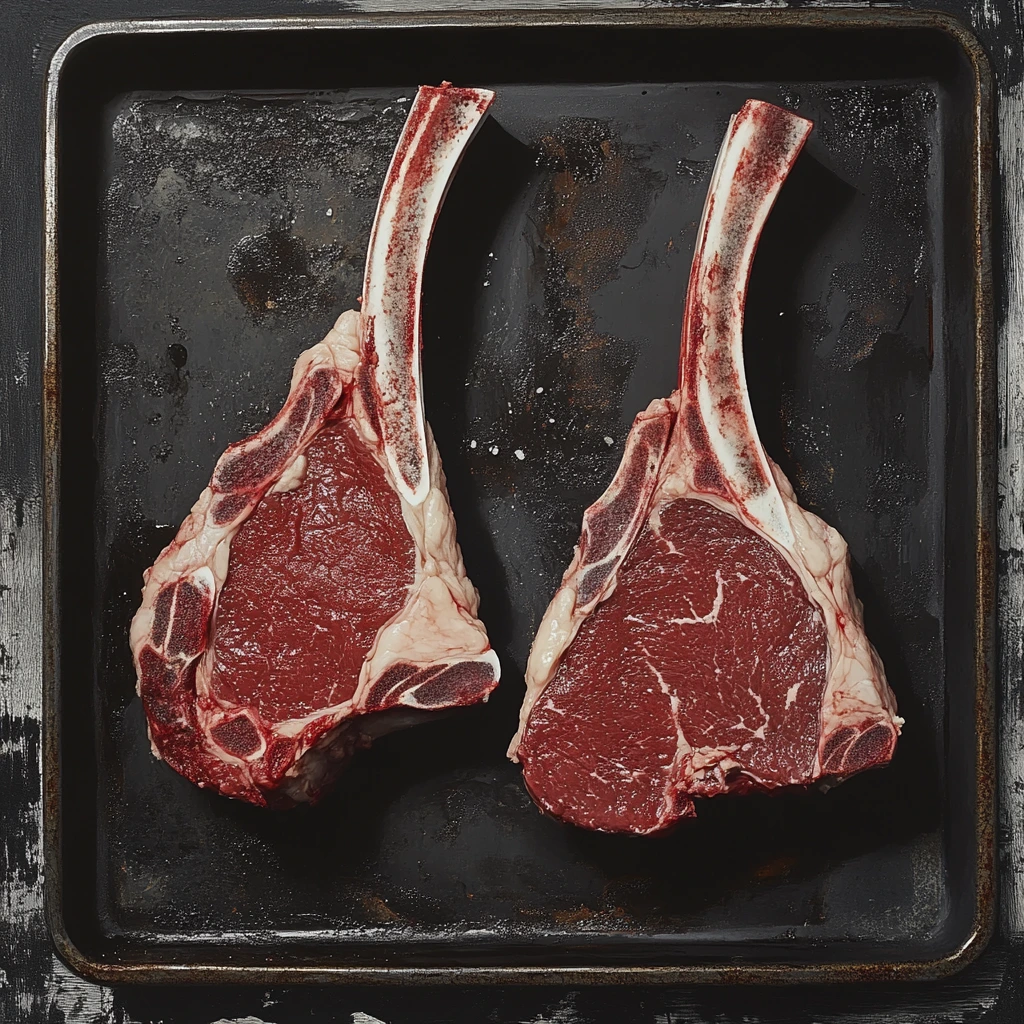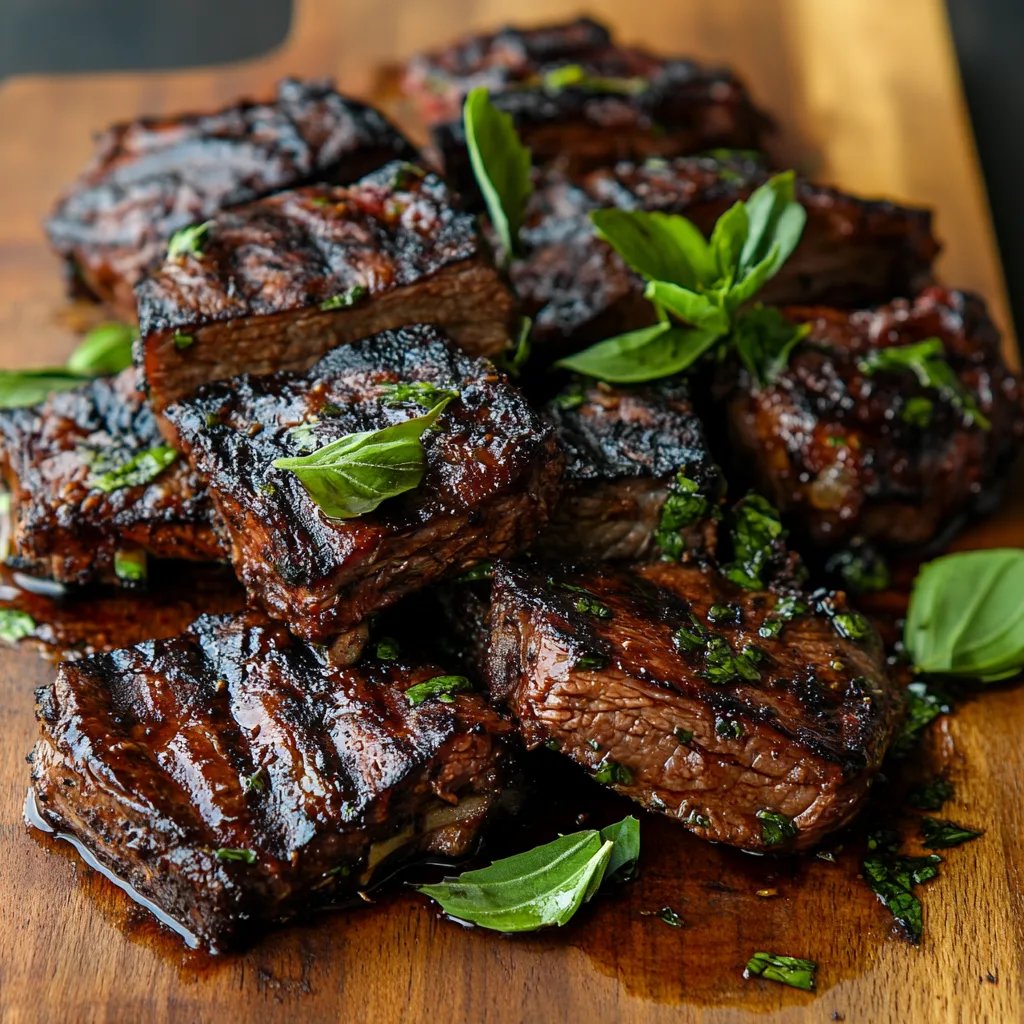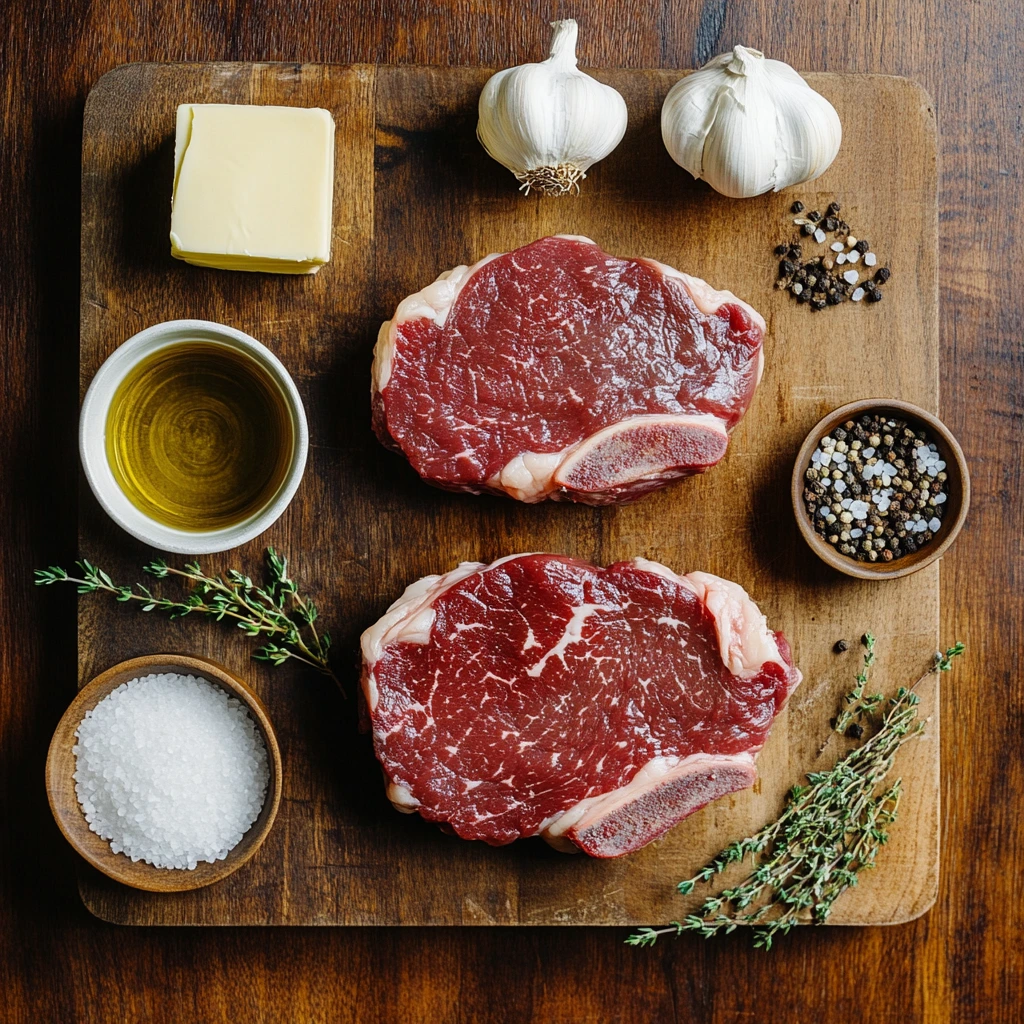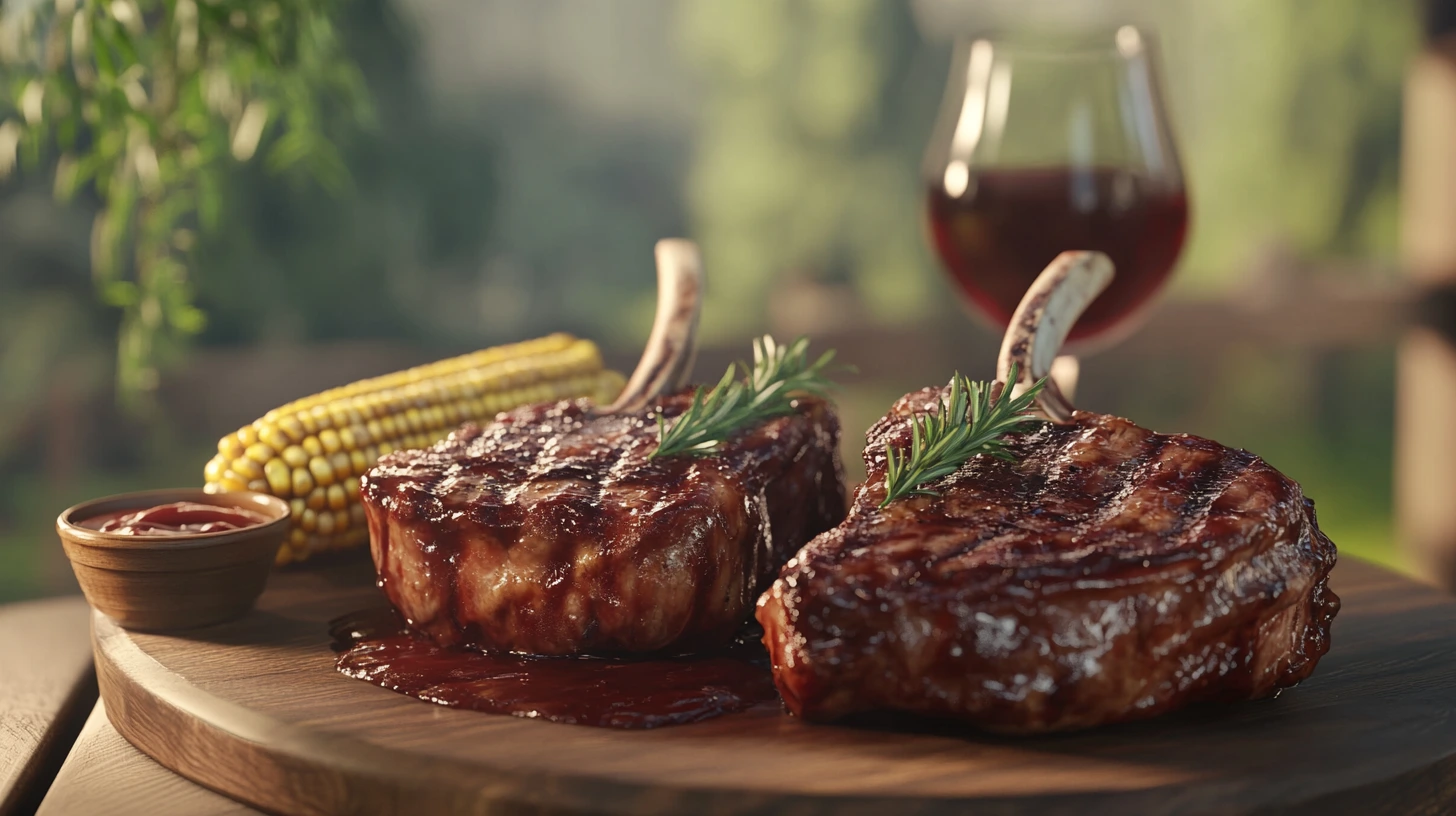Introduction: Why the Bone-In Ribeye Is a Must-Try
There’s something magical about the sizzle of a perfectly cooked steak on the grill. The bone-in ribeye is the ultimate indulgence for steak lovers. Known for its incredible marbling, rich flavor, and impressive presentation, this steak is perfect for special occasions or when you want to elevate your culinary skills.
In this guide, you’ll learn everything about this premium cut, from choosing the best bone-in ribeye to cooking it to perfection and pairing it with the ideal sides and drinks.
Table of Contents
What Makes the Bone-In Ribeye a Standout Cut?
The bone-in ribeye stands apart as one of the most flavorful and eye-catching cuts of beef. This steak is essentially a thick cut to enhance juiciness and flavor. Its bold, rustic presentation often makes it the star of the dining table.

Key Features of a Cowboy Steak:
- Bone-In Flavor: The rib bone enhances the steak’s taste during cooking.
- Generous Thickness: Typically cut 1.5 to 2.5 inches thick, ensuring a tender, juicy bite.
- Rich Marbling: Streaks of intramuscular fat provide unmatched flavor.
Why Is It Called a Bone-In Ribeye?
The name evokes the rugged charm of the Old West, where hearty, flavorful meals were a staple for cowboys. This cut captures that spirit with its robust, satisfying taste and dramatic appearance.
How to Choose the Perfect Bone-In Ribeye for Your Table
Selecting the best cowboy steak requires attention to quality and cut. Follow these tips to ensure you pick the perfect ribeye:
1. Look for Excellent Marbling
Marbling—thin streaks of fat throughout the meat—adds flavor and tenderness. Choose a steak with even marbling for the best results.
2. Consider the Thickness
Thicker cuts (at least 1.5 inches) are less likely to overcook and retain more moisture during cooking.
3. Prioritize Quality Grades
Opt for USDA Prime or Wagyu beef for superior tenderness and taste. These grades have higher fat content and better texture.
4. Shop from Trusted Sources
Visit reputable butchers or online retailers like Snake River Farms or Crowd Cow to ensure you’re getting high-quality meat.
Preparation Tips for Your Bone-In Ribeye Masterpiece
Preparation is the foundation of a perfectly cooked cowboy steak. Follow these essential steps:

1. Bring the Steak to Room Temperature
Allow the steak to sit at room temperature for 30–60 minutes before cooking. This ensures even cooking and prevents a cold center.
2. Season Generously
Keep the seasoning simple to highlight the steak’s natural flavors. Use:
- Kosher salt.
- Freshly ground black pepper.
- Optional: Garlic powder or smoked paprika for added depth.
3. Preheat for a Sizzling Start
Preheating your grill or skillet is essential for achieving a perfect sear. A hot cooking surface locks in juices and creates a flavorful crust.
Cooking Methods for Thick Ribeye Steaks: Grilling vs. Skillet
Grilling Method
Grilling is the classic way to cook a cowboy steak, adding a smoky flavor that enhances the rich, beefy taste.
- Step 1: Sear Over High Heat: Place the steak over direct heat for 2-3 minutes per side to create a crust.
- Step 2: Move to Indirect Heat: Transfer the steak to a cooler part of the grill and cook until your desired doneness.
- Medium-rare: 130°F
- Medium: 140°F
- Step 3: Let It Rest: Allow the steak to rest for 10 minutes to let the juices redistribute.
Pan-Seared and Oven-Finished Method
If you don’t have a grill, this method delivers excellent results with a golden crust and tender interior.
- Heat a cast iron skillet on high and add a tablespoon of olive oil.
- Sear the steak for 2-3 minutes per side to lock in juices.
- Transfer the skillet to a preheated oven at 400°F and cook until the steak reaches your desired internal temperature.
- Add garlic, butter, and rosemary during the final minutes for a rich, aromatic finish.
Garlic Butter Bone-In Ribeye Recipe: A Step-by-Step Guide

Ingredients:
| Ingredient | Quantity |
|---|---|
| Cowboy Steak | 1 (2 lbs) |
| Kosher Salt | 1 tbsp |
| Black Pepper | 1 tsp |
| Garlic Cloves | 3, minced |
| Unsalted Butter | 4 tbsp |
| Fresh Rosemary | 2 sprigs |
Instructions:
- Season the steak with salt and pepper, letting it rest at room temperature for 30 minutes.
- Preheat your grill or skillet to high heat.
- Sear the steak for 2-3 minutes per side, then move to indirect heat or transfer to the oven.
- In the last few minutes, baste the steak with melted butter infused with garlic and rosemary.
- Let the steak rest for 10 minutes before serving.
The Best Side Dishes for Your Bone-In Ribeye
Perfect Side Dishes
- Garlic Mashed Potatoes: Creamy and hearty, these complement the richness of the steak.
- Grilled Vegetables: Asparagus, zucchini, or bell peppers add a fresh, smoky contrast.
- Creamed Spinach: A classic steakhouse pairing for a reason.
Pairing Drinks with a Premium Steak Cut
- Wine: Full-bodied reds like Cabernet Sauvignon or Syrah enhance the steak’s bold flavors.
- Beer: Rich ales or stouts are excellent options for beer lovers.
FAQs About Bone-In Ribeye Cuts
Q: What’s the difference between a cowboy steak and a tomahawk steak?
A: The cowboy steak has a shorter rib bone, making it more manageable to cook and serve compared to the tomahawk steak.
Q: Can I cook a cowboy steak in an air fryer?
A: Yes! Preheat your air fryer to 400°F, and cook the steak for 10–12 minutes, flipping halfway through.
Q: How do I store leftover steak?
A: Wrap leftovers tightly in aluminum foil or place them in an airtight container. Refrigerate for up to 3 days.
Conclusion: Elevate Your Steak Game
The bone-in ribeye is more than a meal—it’s an experience. From selecting the perfect cut to cooking it to perfection, this steak offers unmatched flavor and satisfaction. Whether you’re grilling under the stars or searing in your kitchen, mastering this cut will make you the ultimate steak expert.
Call to Action:
Now it’s your turn! Try these tips and share your cowboy steak experience. Have your own recipe? Drop it in the comments or tag us on social media. Let’s celebrate the art of steak together!


2 thoughts on “Mastering the Cowboy Steak: The Ultimate Guide to a Bone-In Ribeye”